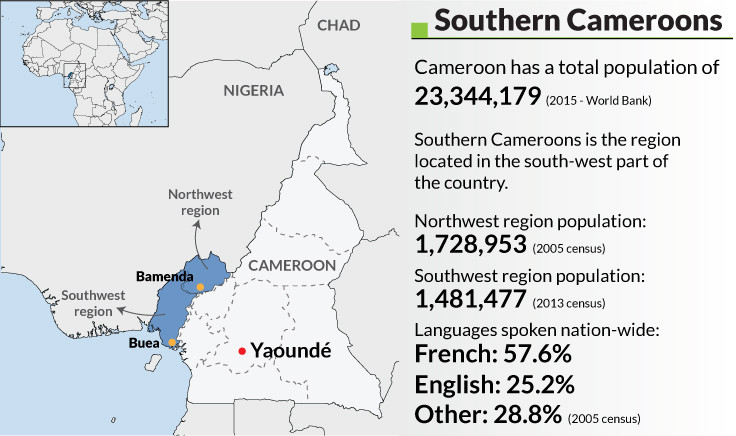How one part of Cameroon still wants to hold on to its Anglo-Saxon roots
As protests continue in Anglophone Cameroon, IBTimes UK looks at the history of Southern Cameroons.
Cameroon is witnessing renewed calls for the independence of its Northwest and Southwest provinces, that constituted the so-called "Southern Cameroons" British mandate during colonisation.
Pro-independence groups have been calling for the breakaway of the two provinces, the only English-speaking regions in Cameroon, amid ongoing protests sparked by language-related tensions.
French and English are the official languages of the west African country. In October, a group of English speaking lawyers took to the streets of Bamenda, capital of Northwest region, to protest against the use of French in courts and the lack of English versions of some legal acts and codes.
Demonstrations continued throughout November with lawyers striking in both the Northwest and Southwest, amid allegations the Cameroonian police "used tear gas to disperse" the lawyers.
The alleged police reaction sparked further demonstrations in Anglophone Cameroon, where teachers and students are now striking in protest against the use of French in schools and the presence of "Francophone teachers" in English-speaking areas.
Amid ongoing protests, some groups called for the restoration of Southern Cameroons alleging the government failed to implement measures that would guarantee self-determination.
Groups claimed that the UN Resolution 1608, passed in April 1961, was not implemented. The document required the UK, Southern Cameroons and Republic of Cameroon to engage in talks on measures to implement for the annexation.
As protests continue in the anglophone areas, amid allegations of between one and four deaths, IBTimes UK looks at the history of Southern Cameroons.
From German colonisation to British mandate
Modern-day Cameroon became a German colony in 1884, during the period known as "Scramble for Africa", denoting the wave of colonisation of the continent by European countries.
However, when the German Empire was defeated in World War Two, the territories were divided between France and England in 1919, leading to the creation of French Cameroons and British Cameroons.
The British mandate of Cameroons consisted of portions of territories that are part of modern-day Nigeria and Cameroon and were divided in Northern Cameroons and Southern Cameroons.
The independence of both French Cameroons and Nigeria in 1960, raised questions on the fate of British Cameroons. Following a series of plebiscites , Northern Cameroons became part of north-eastern Nigeria in 1961.
From federal system agreement to anglophone self-determination calls
The same year, people of Southern Cameroons voted whether to join Nigeria or the Republic of Cameroon. The vote resulted in Southern Cameroons becoming part of the French speaking Republic of Cameroon.
In 1972, the country adopted a new constitution, replacing the federal state with a unitary state.
The move was met with some dissent in the anglophone areas, leading to the creation of the "Cameroon Anglophone Movement" in 1984.
People originally sought a return to a federal system and called for "Anglophone self-determination", but eventually started calling for independence.
"In 1961, our people were given two choices and we decided to join Cameroon and create a confederation. We did not decide to create an alien government for our people, as eventually became the case. People in Ambazonia [Southern Cameroons] are calling for independence without pre-conditions," Ngu Tatih, from the Ambazonia Governing Council, told IBTimes UK. Ambazonia is a term used to identify the movement that seeks the restoration of Southern Cameroons.

The 1990s saw the establishment of the Southern Cameroons National Council (SCNC), and anglophone separatist organisation advocating for secession. The group has been outlawed by the Cameroonian government.
The council eventually split in some factions, including the Southern Cameroons Youth League (SCYL), led by Ebenezer Akwanga.
"Political sequences took place which affected our culture, language, traditions, everything that makes us a people. Our goal was simple: We wanted the total and unconditional independence of the Southern Cameroons," Akwanga, a former political prisoner in Cameroon told IBTimes UK.
He also said pro-independence people might ally with pro-Biafrans in south-eastern Nigeria, who are also calling for independence.
© Copyright IBTimes 2025. All rights reserved.






















